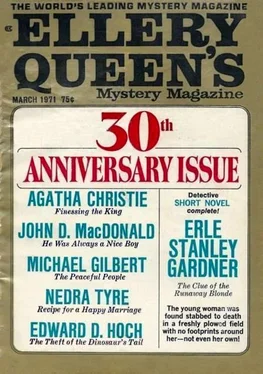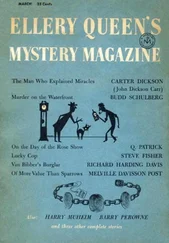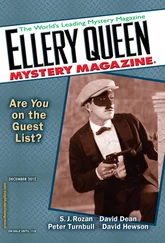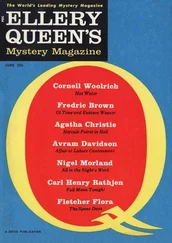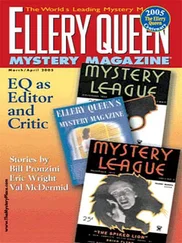Jon Breen - Ellery Queen’s Mystery Magazine, Vol. 57, No. 3. Whole No. 328, March 1971
Здесь есть возможность читать онлайн «Jon Breen - Ellery Queen’s Mystery Magazine, Vol. 57, No. 3. Whole No. 328, March 1971» весь текст электронной книги совершенно бесплатно (целиком полную версию без сокращений). В некоторых случаях можно слушать аудио, скачать через торрент в формате fb2 и присутствует краткое содержание. Город: New York, Год выпуска: 1971, Издательство: Davis Publications, Жанр: Классический детектив, на английском языке. Описание произведения, (предисловие) а так же отзывы посетителей доступны на портале библиотеки ЛибКат.
- Название:Ellery Queen’s Mystery Magazine, Vol. 57, No. 3. Whole No. 328, March 1971
- Автор:
- Издательство:Davis Publications
- Жанр:
- Год:1971
- Город:New York
- ISBN:нет данных
- Рейтинг книги:3 / 5. Голосов: 1
-
Избранное:Добавить в избранное
- Отзывы:
-
Ваша оценка:
- 60
- 1
- 2
- 3
- 4
- 5
Ellery Queen’s Mystery Magazine, Vol. 57, No. 3. Whole No. 328, March 1971: краткое содержание, описание и аннотация
Предлагаем к чтению аннотацию, описание, краткое содержание или предисловие (зависит от того, что написал сам автор книги «Ellery Queen’s Mystery Magazine, Vol. 57, No. 3. Whole No. 328, March 1971»). Если вы не нашли необходимую информацию о книге — напишите в комментариях, мы постараемся отыскать её.
Ellery Queen’s Mystery Magazine, Vol. 57, No. 3. Whole No. 328, March 1971 — читать онлайн бесплатно полную книгу (весь текст) целиком
Ниже представлен текст книги, разбитый по страницам. Система сохранения места последней прочитанной страницы, позволяет с удобством читать онлайн бесплатно книгу «Ellery Queen’s Mystery Magazine, Vol. 57, No. 3. Whole No. 328, March 1971», без необходимости каждый раз заново искать на чём Вы остановились. Поставьте закладку, и сможете в любой момент перейти на страницу, на которой закончили чтение.
Интервал:
Закладка:
Quinlan said, “If that should turn out to be important evidence—”
“Well,” the sheriff said, “I guess you and I can remember those tracks well enough to identify the automobile, can’t we?”
“Yes, but—”
“Go on.”
“Nothing.”
“All right,” Bill Eldon said at length. “Tell you what you do, George. Take a page from your notebook and just tear off a bit here and there until we get it so it just fits that place out of the right front tire.”
Quinlan nodded. He took a page from his notebook and bent over the tracks in the moist earth, carefully tearing off little bits of paper until he had the size and shape to suit him. “It’s an exact fit, Bill.”
“All right,” the sheriff said. “You keep it. Now let’s drive on to the house. I want you to take a look at that cigarette case.”
“We’ll obliterate these tracks,” Quinlan objected.
“But we’ll know the car if we ever run across it on account of that tire,” the sheriff drawled. “Come on, George.”
Quinlan started to say something, then checked himself.
They drove through the plowed strip of ground to the level field where the car jolted along over the weed-encrusted road, through the big shade trees, to the Higbee house.
The sheriff led the way to the creaking side door which he opened.
The scurrying of rats and mice for shelter was distinctly audible, a pattering of tiny feet beating a tattoo of panic on the floor.
The sheriff paused long enough to lower the angle of the flashlight. “At least one woman, and at least one man,” he pointed out. “Sort of zigzagging around.”
Quinlan’s half-articulate comment was little more than a grunt.
Bill Eldon shifted the beam of his flashlight. “This way to the kitchen, George.”
They entered the kitchen. The beam of the flashlight showed the table with its waxed paper, the lipstick, the cigarette stubs, and the charred groove in the table. The beam of the flashlight illuminated the silver cigarette case, glanced from it in a splash of reflected light on the cob webbed ceiling.
Quinlan opened the fingerprint outfit he was carrying, carefully gripped the corners of the cigarette case with rubber-tipped tongs, and dusted powder over the silver.
“Hump! That’s funny.”
“What’s the matter?”
“There isn’t a print on it.”
“Maybe the person who handled it was wearing gloves,” the sheriff said. “How about the lipstick?”
Quinlan managed to get two prints from the lipstick that were legible enough to give results.
The sheriff seemed unimpressed to the point of disinterest. His flashlight was exploring the floor. “One burnt match,” he said. “That’s significant.”
“I don’t get it.”
“If you were lighting three cigarettes how many matches would you use?”
Quinlan grinned. “If a good-looking girl was sitting across the table from me I’d use one — wait a minute, I’d use two.”
“That’s right. But there’s only one.”
“Then something must have happened to one of the burnt matches. Perhaps a pack rat carried it away.”
“Nope,” the sheriff drawled. “It ain’t that. The way I figure it, the man was a chain smoker. He and the girl sat down here at the table. They had some sandwiches, then they settled down for a smoke. He lit her cigarette and lit his own — one match. After they’d smoked their cigarettes he lit his second one from the stub of the first. The girl only smoked one cigarette. When she’d finished it she took out her lipstick and started to fix up her mouth — and it was then something happened, right at that particular moment.”
“How do you fix it as being at that time?”
“Because they jumped up and were startled. The man put his cigarette down on the table and never had a chance to get back to pick it up. It lay there and burned that groove. The woman dropped her lipstick.”
“And then?” Quinlan asked.
“And some time after that,” the sheriff said, “the girl was found stabbed in a plowed field with no tracks going in either direction, not even her own.”
“How long after that?” Quinlan asked.
“That, son,” the sheriff said, “is something we’ve got to find out. By puttin’ two and two together, you get an answer, and it don’t seem to be the right one.”
It began to rain about three in the morning, a fine, misty cold rain. By daylight the tangled grass and weeds of the field were glistening with moisture, and the dark lumps on the ridges of the plowed ground reflected the sullen daylight which filtered through the low bank of clouds.
The bent figures of the sheriff and George Quinlan moved slowly along over the boundary between the grassy field and the freshly plowed earth. With the thoroughgoing patience of veteran trackers they inched their way along, covering every foot of ground.
Daylight was well advanced and the drizzle had stopped when they returned to their point of beginning.
“Well,” Quinlan said, “that settles it. No one left this piece of ground after the murder was committed, so the body must have come in from the outside — unless it was dropped from an airplane.”
The sheriff straightened. He rolled and lit a cigarette. “I noticed one thing back there in the house, George. You remember where those drapes hang over the door? There’s a long braided silk doodad with tassels on it — but there’s only one. Shouldn’t there be two?”
Quinlan laughed. “Shucks, Bill, the way this place has been left it’s lucky there’s even one. But there should be two. I’ve got the same sort of drapes at home.”
The sheriff thought for a while. “What do you s’pose frightened those people after they’d just eaten?”
“I’m darned if I know,” Quinlan said. “I’m an officer, not a mind reader. It must have been shortly before the murder, and that must have been after dark. Seems strange they’d have been eating sandwiches then. They must have planned to stay all night searching. And speaking of eating, I’m going home, change my wet clothes, and have some breakfast.”
“Well, now,” the sheriff drawled, “guess I’ll drop in at a restaurant and—”
“A restaurant!”
“Uh huh. My sister-in-law’s stayin’ up at my house.”
Quinlan laughed. “Come on up with me — no, hang it, if you don’t change your wet clothes you’ll catch cold. Get up to your house and get into some dry clothes.”
The sheriff looked down at his wet trousers, sighed wearily. “Well, I s’pose I’ve got to.”
It was a few minutes before nine when Beryl Quinlan saw Roy Jasper turn the comer and come walking toward the house.
Beryl ran to the door, whipped it open, and dashed down the stairs. Roy saw her coming and flung up his arm in a gesture of greeting. They met at the edge of the sidewalk.
“Roy!”
“Hi, Beryl!”
She gave him her lips in a swift eager kiss, then pulled away.
“Hey,” he said, “what’s the idea of such a nervous little peck?”
“We may have an audience. Come on, I want to talk with you. When did you leave the fort?”
“Last night — late.”
“Been up all night?”
“Just about. Couldn’t get a bus until after midnight. Travel sure is heavy these days.”
“Where were you when you telephoned me, at the fort?”
“Just outside of the fort, a row of telephone booths there. Why?”
“Oh, just wondering. Let’s not go in for a minute. Dad’s been out pretty much all night on a case and came home soaking wet, took a hot bath, changed his clothes, and has to go to the office in a minute. The family will engulf you if you go inside. Let’s sit out on the porch.”
“Suits me,” Roy said. “This isn’t front-porch weather, though. Been raining here?”
Читать дальшеИнтервал:
Закладка:
Похожие книги на «Ellery Queen’s Mystery Magazine, Vol. 57, No. 3. Whole No. 328, March 1971»
Представляем Вашему вниманию похожие книги на «Ellery Queen’s Mystery Magazine, Vol. 57, No. 3. Whole No. 328, March 1971» списком для выбора. Мы отобрали схожую по названию и смыслу литературу в надежде предоставить читателям больше вариантов отыскать новые, интересные, ещё непрочитанные произведения.
Обсуждение, отзывы о книге «Ellery Queen’s Mystery Magazine, Vol. 57, No. 3. Whole No. 328, March 1971» и просто собственные мнения читателей. Оставьте ваши комментарии, напишите, что Вы думаете о произведении, его смысле или главных героях. Укажите что конкретно понравилось, а что нет, и почему Вы так считаете.
